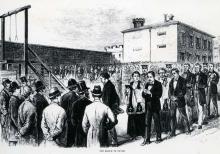I’ll bet most people in New Hampshire have no idea how many security and surveillance agencies we have here. I know I didn’t. Other than local police, sheriff and state police departments I discovered we also have access to these, thanks to today’s technology:
Home - Law Enforcement Center Cyber
Search the Data | Atlas of Surveillance
Welcome to the Division of Homeland Security & Emergency Management | Homeland Security and Emergency Management
The Mission Statement of the Division of Homeland Security (last link) states: “To provide an integrated, all-crimes/all-hazards, information sharing network to collect, analyze and disseminate information derived from multiple sources to stakeholders in a timely manner, in an effort to protect the citizens and the critical infrastructure of New Hampshire, while ensuring the protection of civil rights and civil liberties.”
Oh. OK. So, the state currently has an “information sharing network from multiple sources” and currently shares this counterintelligence information throughout law enforcement per RSA 651-F.
On Thurs., Jan. 15th, the Executive Depts. and Administration Committee held a public hearing on HB 1605. Sponsored by Liberty Alliance member Rep. Mike Belcher – Wakefield, this proposed legislation will “establish the state intelligence and counter-intelligence office within the department of safety.”
Now wait a minute, don’t we already have that in the Dept. of Safety? Yes, we do but according to Belcher, "What it really is, is a normal investigative office that would be tasked specifically with looking at threats posed by foreign hostile actors, largely the Chinese." And of course this bill comes with a price tag all at a time when the Republicans are repealing every form of state revenue in sight, leaving the property owner holding an ever burgeoning bag! How does $6 million sound for a redundant office employing about a dozen people whose focus is on China? According to language in the bill, the state would also purchase "nondescript surveillance vehicles, an unarmed aerial surveillance platform, and night vision or thermal imaging devices, or both, and operational costs." Even the Dept. of Safety acknowledged this bill would be “duplicative to the efforts that have existed since 2010.”
As with their desire to bring back capitol punishment, which costs more than a life sentence, where are they going to scrounge up the money? GoFundMe? Higher property taxes? Repealing more community minded services? Voting in a terrible budget?
How about concentrating on furthering the intelligence of NH students by enacting previous court orders and properly fund public education? And I don’t mean the segregated kind.









